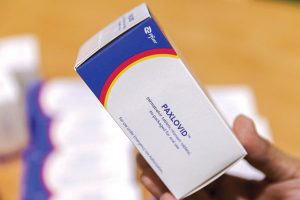Bloomberg
Talks to negotiate a lower price for Pfizer Inc.’s Covid antiviral pill Paxlovid in China didn’t pan out, the health authority said, creating a quandary for the government amid a rampant outbreak in the world’s most populous nation.
Pfizer and the government agency that oversees the state medical insurance program failed to agree on a further cut on the price of Paxlovid, which initially sold for 2,300 yuan ($339) and was recently lowered to about 1,900 yuan for a course of treatment, according to Chinese media reports. It is currently covered by state medical insurance under a provisional measure, which will continue until end of March, the National Healthcare Security Administration said in a statement on Sunday.
The government remains in talks with Pfizer for a licensing deal to allow domestic companies to manufacture generic versions of Paxlovid, Reuters reported on Saturday, citing people it didn’t identify. While five Chinese companies make inexpensive, generic versions of Paxlovid for low-income countries under an agreement with the United Nations-backed Medicines Patent Pool, they cannot sell the output in China.
Pfizer’s unwillingness to further reduce Paxlovid’s price underscores the challenge Beijing faces in getting US and European drugmakers to help ease its strain in dealing with a colossal wave of Covid that has overwhelmed hospitals and caused medicine shortages.
Continued Collaboration
Pfizer will continue to collaborate with the government and other stakeholders to secure an adequate supply of Paxlovid in China, even though negotiations for state insurance coverage didn’t work out, the New York-based drugmaker said in a statement to Bloomberg on Monday.
Given China’s under-developed private medical insurance market and the reliance of its 1.4 billion people on the state-run program, Beijing has been dangling inclusion on government’s reimbursement list to push drugmakers to offer deep cost cuts. It negotiates once-a-year to set prices for newly approved and life-saving medicines that are part of the 2.87 trillion yuan ($420 billion) state program, which covers more than 95% of the population.
 The Gulf Time Newspaper One of the finest business newspapers in the UAE brought to you by our professional writers and editors.
The Gulf Time Newspaper One of the finest business newspapers in the UAE brought to you by our professional writers and editors.
